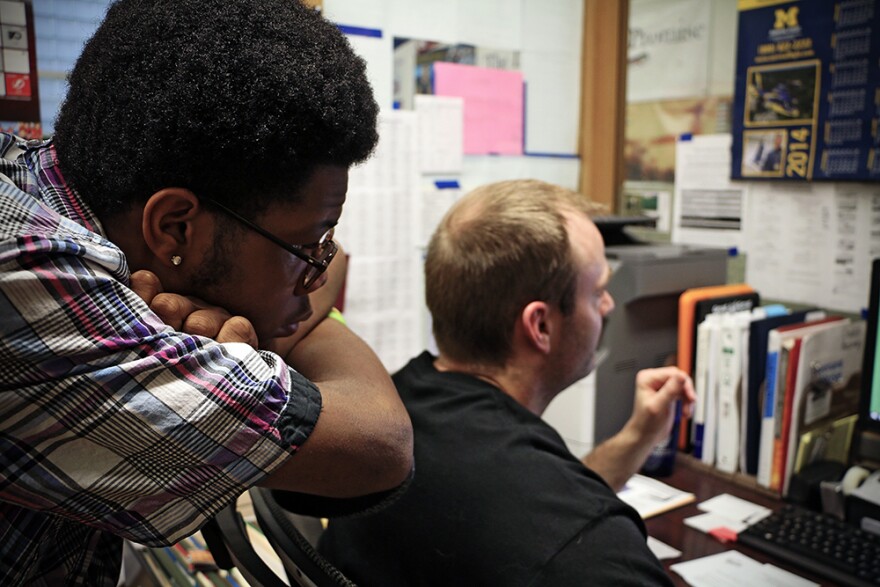It’s high school graduation season, and there’s lots to celebrate. Michigan’s four-year graduation rate is 79%, the highest it’s been in years.
But for students of color and students from low-income families, the rate is significantly lower. To bring those numbers up, some schools let students at risk of failing “recover” credits to stay on track for graduation. But are those methods as rigorous as they should be?
Take Cody's Medicine and Community Health Academy, a small high school on Detroit’s west side where almost all the students are black and qualify for free lunch. We featured Cody in a recent hour-long radio special – Mister Knight's Neighborhood – about how the school transformed from a so-called "dropout factory" to a school that's doing whatever it takes to get its students to graduate.

One of the students featured in Mister Knight's Neighborhood is 16-year-old Kevin. (Apiary Projects made a short video about Kevin.https://vimeo.com/126194302"> Check it out.) He's a junior at Cody and one of the school's star football players. Everybody talks about what a great football player Kevin is, how he might go pro one day. But that’s not his main goal in life. His two big goals are to "make it out the 'hood" and "no matter what, do four to eight years of college."
But there's a problem. Kevin just got his mid-semester progress report, and he's failing four of his classes.
"You can’t get in college, no Big Ten college, with the grades on this progress report," says Kevin.
Kevin has a plan, though. He wants to "get all this extra credit and try to turn all these Fs to Cs before these grades go in." A few minutes later, Kevin walks into his world history classroom to ask his teacher, Jeremy Singer, for extra credit so he can bring up his grade.

And he does it. Singer gives him two assignments and tells Kevin "you're going to pass this quarter if you do them." Singer looks uncomfortable giving out this extra credit, like he’s embarrassed about it.
"The whole approach to grades and what it means to pass and like what the standards are for passing are so wonky here," says Singer, "that I started offering a lot of opportunities for extra credit."
Singer is a Teach For America teacher at Cody. This is his first year at the high school. He says way more than 50 percent of the kids in his class are failing, so he gives out extra credit. He lets them turn in work that was due a month ago so they can pass.

"It doesn’t feel right, but it’s kind of like standard practice, so, I’m just doing it."
There are three ways to get back on track if a student is failing a class at Cody:
- Ask for extra credit.
- If that’s not enough to bring their grade up, then students have to do credit recovery – a free, after-school program, mostly online, for students who fail a class and need to re-take it.
- If they fail that, they get one more chance in summer school.
More than a third of Cody students are in credit recovery, most of them freshmen.
The school’s counselor, Robert Donoghue, says credit recovery is good thing because it lets students work at their own pace and get more one-on-one help. "As far as getting As and Bs they might never get there," says Donoghue, "but they learn how to pass a class, a little bit of professionalism, and they get through it."
“It’s certainly not the equivalent of being in class and engaging with your fellow students,” says Cody English teacher Josh Andrew, “but it’s a necessary alternative because kids need it.”
But there’s hardly any data on these programs; we don’t know how rigorous credit recovery programs are, or whether they prepare students for college.
More than a third of Cody students are in credit recovery, most of them are freshmen.
Henry Levin is a professor of economics and education at Teachers College, Columbia University. He feels strongly that things like credit recovery "are really responses to the pressures to raise high school graduation rates, rather than a serious attempt to educate students"
At struggling schools like Cody, progress is measured in large part by whether graduation rates improve. So there’s an added incentive to do whatever it takes to get kids to graduate. And the push to graduation makes sense: numerous studies show high school graduates are much better off than their peers who dropped out.
But Levin says those outcomes can't necessarily be applied to students who graduated by taking credit recovery courses. "The assumption is that these are high school graduates, but they're not high school graduates in the normal sense, and thus it gives an illusion of knowledge and functioning that is not based on real evidence."
Cody teacher Jeremy Singer wants all his students to walk across that stage and get their diplomas, but he’s just not sure practices like extra credit at the eleventh hour and credit recovery are in his students’ best interest.
"I don’t think the degree from Cody right now is a proxy that says 'because you have this degree we’re confident that you’ll get through college,'" says Singer.
And he says that is a problem.







